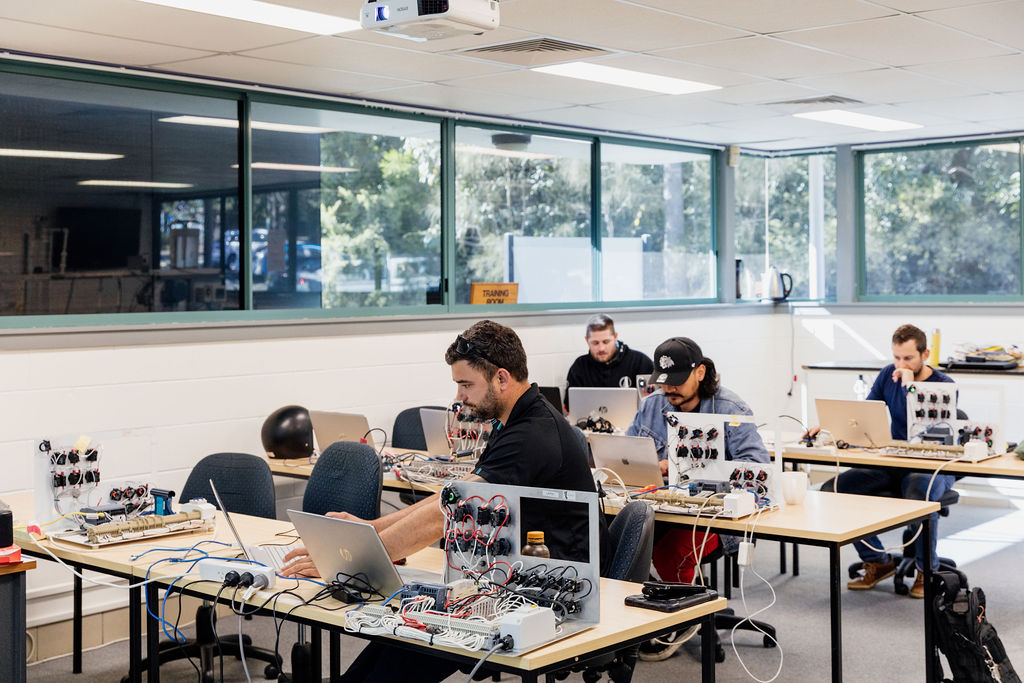Electrical Instrumentation and Control is an exciting field that combines creativity with purpose. It offers many career opportunities. The field is important for electrical systems and machinery, supporting their design, installation, maintenance, and troubleshooting.
What’s exciting about this area isn’t just the technology side, but how it’s used across so many industries. The field is growing and needs a mix of skills. It also provides many benefits and opportunities for growth.
Industry Overview and Job Outlook
Electrical Instrumentation and Control has grown rapidly in various industries over the years. With the rapid pace of technological advancements, it’s become a job area that’s always in demand.
Renewable Energy
Gone are the days when renewable energy was a distant dream. It’s now a core part of the global energy plan. Professionals in electrical instrumentation and control play an instrumental role. They ensure that energy from the sun and wind is stored, used, and shared smoothly.
The push for cleaner energy creates many job opportunities in renewable energy. From setting up massive wind turbines to designing solar panel setups, each step requires careful attention. This sector offers roles in maintenance, operation, and even inventing new equipment.
Industrial Automation
Automation has been around for a while, but its growth in recent years has been remarkable. Businesses everywhere are adopting automation for better accuracy, efficiency, and growth. Here, electrical instrumentation comes into play, ensuring machines work perfectly together to increase output.
The rapid growth in industrial automation highlights the growing need for skilled experts. These professionals understand process control systems and adapt them for different industries. Their expertise helps factories run efficiently and sets the stage for new breakthroughs.
Smart Homes
Homes have evolved a lot in recent years. Smart homes, which combine convenience with efficiency and safety, are defining modern living. Electrical instrumentation and control are fundamental to this shift.
As smart homes become more common, experts in this field are in high demand. These experts create intricate electrical systems, so people can control their homes easily. They make sure that technology fits easily into our lives, by adjusting lights and adding security features.
Skills and Qualifications Required
In Electrical Instrumentation and Control, it’s important to have both theory and hands-on skills. It’s more than just understanding machines. It’s about bringing together different skills to get the best results.
Electrical Engineering Knowledge
At the heart of electrical instrumentation and control is understanding electrical engineering.
This means understanding not just the basics. It means knowing the specifics of tools like control systems too. Having this knowledge helps you design and fine-tune advanced electrical systems effectively.
Programming Skills
In today’s electrical gear, software plays a huge part, and that’s where programming comes in.
Most new-age electrical systems rely on software. So, if you’re good with popular programming languages like C++, Python, or Java, you’re in a great spot. This skill helps systems work their best, meeting different needs accurately.
Analytical Skills
Working in Electrical Instrumentation and Control means facing complex problems regularly. And that’s where sharp analytical skills come in handy.
With a knack for analysing, you can look at complex data, spot patterns, and find issues. Most importantly, you can find ways to ensure that everything goes well.
Communication Skills
Electrical Instrumentation isn’t just about tech know-how. Being able to talk about it matters too, especially given how complex things can get.
People in this field work with various others, including experts and non-tech people. When you explain things clearly, it keeps everyone informed and helps work progress smoothly.
Types of Job Opportunities Available
Within Electrical Instrumentation and Control, there are a number of career avenues. Each role, while interconnected, offers unique responsibilities and prospects.
Electrical Engineer
Electrical Engineers are fundamental to the development of electrical innovations. They design and test electrical systems to make sure they are safe and reliable.
Their extensive knowledge of electrical principles is crucial in the field of electrical technology.
Control System Engineer
Control System Engineers play a pivotal role in the realm of electrical systems. Their main job is to create and improve systems so that all parts work well together.
They use their expertise to make sure that everything works well – from basic parts to advanced tools. This contributes to the overall efficacy and reliability of the electrical infrastructure.
Instrumentation Technician
Instrumentation Technicians specialise in the finer details of electrical systems. This would encompass installation, maintenance, and repair.
Their in-depth knowledge spans both the overarching and intricate aspects of electrical frameworks.
Their work ensures that every part of an electrical system works well together, so it performs at its best and meets set standards.
Salary and Growth Potential
The appeal of careers in Electrical Instrumentation and Control isn’t just about the exciting work and varied opportunities. There are also great financial benefits and potential for advancement in the industry.
Electrical Engineer:
Electrical Engineers are prominent figures in this sector. Their average yearly salary stands at $97,970. Beyond the financial benefits, their expertise garners respect and acknowledgment from the industry. With a growth rate similar to the national average at 6%, it’s clear that there’s a consistent need for Electrical Engineers, especially in our increasingly digital world.
Control System Engineer:
Control System Engineers, experts in managing complex electrical systems, earn an average annual salary of $88,500. The increasing importance of automation ensures they have a growth rate of 5%. Their skills are in high demand due to the expanding range of uses for their expertise.
Instrumentation Technician:
Instrumentation Technicians, specialists in exacting tasks, have an average yearly salary of $62,090. Their growth rate of 4% confirms the consistent demand for their skills in the industry. Their role is essential, given the precision and detail required in electrical systems.
On a larger scale, the future looks bright for Electrical Instrumentation and Control professionals. With shifts towards renewable energy, increasing manufacturing needs, and the growing smart home sector, opportunities are on the rise. For those keen on this field, it offers not just financial rewards, but also a career filled with innovation and long-term relevance.
How to Prepare for a Career in Electrical Instrumentation and Control
If you’re keen on building a career in Electrical Instrumentation and Control, it’s important to have a strategy and foundational knowledge.
- Get a Degree: A bachelor’s degree inelectrical engineering or a related field is typically required.
- Develop Programming Skills: Gain proficiency in programming languages like C++, Python, and Java to increase employability.
- To Gain More Experience: Consider internships and co-op opportunities to gain hands-on experience in the field.
Are you interested in starting a career in Electrical Instrumentation and Control?
As technology evolves and intertwines more deeply with our daily lives, the need for professionals in the Electrical Instrumentation and Control industry will only amplify. The opportunities are boundless, and the rewards, both in terms of professional growth and societal impact, are profound. EIM Training offers courses in Electrotechnology to help get you ready for your new career. If you have any questions, contact us today.




